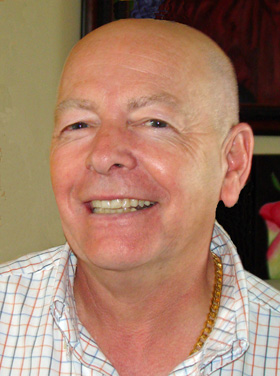|
Even when you are away from the
domain crowd you could bump into McNair just about anywhere on
the globe, from Africa (where he has been twice this
year on charity missions) to Thailand's Phuket Island
where he and his wife of more than 40 years, Beth,
maintain a home in Patong. It's a house that McNair
seldom sees. The chronic world traveler spends hundreds
of nights in hotel rooms each year. As a result, he is on a
first name basis with Marriott staffers at just about
any port of call you could name, including the one in our home
town of Tampa, Florida. When
McNair visited me in mid-October for the interview this story
is based on he summed up his wanderlust and multitude of
business ventures by saying, "In my life I want to do
as many different things as I possibly can!" McNair has
applied that philosophy in both his personal and business
lives since his days as a schoolboy in Melbourne, Australia.
A good example of his desire to touch all of the bases
on his run through this life is the fact that as a teenager
McNair had a tough time deciding whether we would rather be a farmer
or a stockbroker. He would wind up doing both
and doing them very successfully well before his 25th
birthday.
|
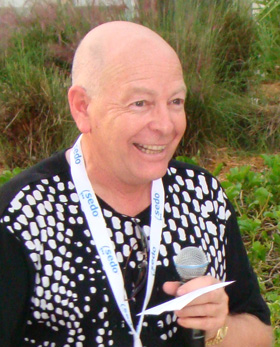
Gregg
McNair at a Sedo conference in
Key West, Florida - October 2009 |
McNair and his family were urbanites
to the core, but his innate desire to explore the unknown
blossomed into a fascination with something 180 degrees
opposite from his city environment. "I remember riding on
the subway with a copy of the Financial Review
under one arm and an agriculture journal called The
Weekly Times under the other," McNair recalled.
As a boy, when attending agricultural shows (similar to
county or state fairs in the U.S.), McNair often went missing
but his parents always knew they could find him at the cow or
pig exhibits. "I wanted to talk with the farmers whenever
I could," McNair explained.
With his admittedly short attention
span, McNair found himself bored to death with school and
wound up quitting when he was 17. He took a job, but without a
diploma a stock brokerage career appeared to be out of the
question and it would take a long time for a dropout to earn
enough money to buy the farm he had always dreamed of.
|
McNair said his life changed when he
met some Christians who helped him understand what life was
really about. He started going to church where
he said, "All of a sudden I found some sort of purpose
and direction." He traveled to some faith-based
conferences including one trip to the Australian island state
of Tasmania. His girlfriend at the time also went,
traveling separately with her family. However, the object of
Gregg's affections was about to change. "As soon as I
walked into the building where the meeting was being held, I
spotted Beth across the room," McNair said. "It was
love at first sight for me." Appropriately enough Beth
would turn out to be a farmer's daughter.
The problem was Beth didn't seem to
be as immediately enamored with Gregg as he was with her. Not
to worry. "I don't think anything happens accidentally
- I think there is a plan," McNair said. Sure
enough what happened next was almost too good to be true. The
custom at these conferences was for local families to each
take in a guest that was visiting from out of town. When names
were drawn, Gregg was stunned and delighted to find he had
been assigned to stay with Beth's family.
|
He made the most of that opportunity
and with the charm he still exhibits today Gregg soon won Beth
over. When he got back to Melbourne, still just 18 years old,
he told his family he wanted to marry her. They of course
thought he was too young and in an effort to dissuade him, his
mother said he would have to get a job making $100 a
week (a tidy sum back then) before he could support a wife.
McNair protested that was as much as his dad made as the state
manager of a well-known pharmaceutical company. They were adamant though, so
Gregg went to school at night to complete the requirements for
his diploma while simultaneously studying to pass the Securities
Institute's exam. He accomplished both tasks and managed to get an entry level position
at a local brokerage firm as well.
Three months after he started, Gregg
was making 50% more than his dad and he and Beth were
soon married. In September this year they spent three days in Rome
celebrating their 40th wedding anniversary.
|
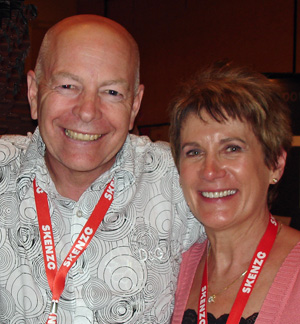
Gregg
& Beth McNair
celebrated their 40th Anniversary
in September 2009 |
McNair's position in the brokerage
office also seemed to be heaven sent. While in his early 20's
a mining boom in nickel stocks occurred and McNair made a
series of highly profitable trades as the stocks went through
the roof. Better yet, now that he had sufficient money in
hand, McNair could trade the pinstripe suits he was never
comfortable in for the farm life he always imagined. He and Beth used the
money to buy a farm in her native state of Tasmania and Gregg
was off on a new adventure. "Beth wasn't quite as
excited," McNair said. "She married a city slicker
to get her away from the farm, then just three years later I
took her back to one!"
|
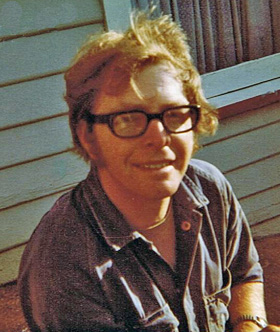
McNair
during his years
as farmer in Tasmania |
They spent 12 years working their
land with Gregg's father-in-law Harry, a fourth
generation farmer, offering plenty of advice along the way.
McNair loved his father-in-law but they
were often at odds because Gregg wanted to try new things he
had read about while Harry told him he should stick to
tried and true methods. Gregg loved nothing more than
succeeding with one of his own ideas and proving Harry wrong
(even though he said Harry never admitted it)!
The McNairs grew peas and
opium poppies (used by pharmaceutical companies to
produce prescription painkillers)
and managed a herd of dairy cattle that grew to 400 head.
McNair was literally in hog heaven for about a decade before
he started feeling a little restless again. The downside to
farming was that you could do everything right and
still get wiped out by a natural calamity. Entire crops
of peas were lost in a drought and a single lightning strike
killed 30 cows in one explosive flash.
|
Even so he had gained a reputation
as an innovative and successful farmer and that would bring
him an unexpected opportunity to travel the world. McNair won
Tasmania's prestigious Lactos Global Scholarship (akin
to Dairy Farmer of the Year in the U.S.), a prize worth $50,000
that sent the winner on a four-month tour of the 22 leading
dairy nations in the world. "This was the first
significant international travel I had done and it opened my
eyes to machinery and technology that had never been
introduced to Australia or New Zealand," McNair said.
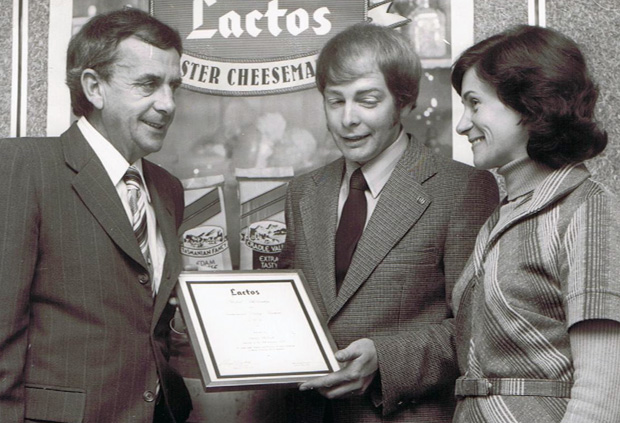
Gregg
McNair (center), with wife Beth, receiving the
prestigious Lactos Global Scholarship
from the Tasmanian Minister for Agriculture Mr. Lloyd
Costello (left).
|
"I wound up picking up a lot of
franchise rights for machinery, like milking
equipment, and technology that I was able to
capitalize on when I returned home. With these new
opportunities I found it difficult to settle back into
what I had been doing," McNair added. As part of
his scholarship award he was required to speak at
about a dozen dairy farmer functions around |
|
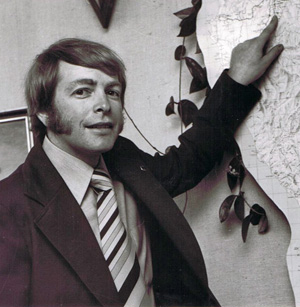
McNair
on his lecture tour after visiting
22 nations as the Lactos Global Scholar |
the state. He met those obligations and
continued to run his farm a bit longer, but now he and
Beth were both thinking about a move back to
Melbourne. The decision was cemented when their kids
reached a level in school where they would have had to
travel 90 minutes each way from their rural area to
the nearest classroom. They decided they had done well
enough now to lease out the farm and retire to the
city.
It was the early 80s and of course
McNair, still well shy of his 40th birthday. would not be
content sitting in a rocking chair on his front porch in
Melbourne. He took a national volunteer role with Christian
Business Men - Australia and served as their Executive Director for six
years, building the group into a much bigger and stronger
association. During this time he also gained qualifications as
a Realtor and was involved in buying and
developing property, both commercial and residential. |
In another venture McNair partnered
with a friend to found the National Reservation System (NRS),
a ground breaking travel service that for the first time let
travelers book hotel rooms at the same time they scheduled
flights. That company was eventually sold and it later
found its way into the hands of American Airlines who incorporated it
into their Sabre electronic reservations system. McNair
gained a lot of valuable business experience with the NRS
project, raising funds through a public offering to build it
and growing the staff to 180 people.
After NRS he went on a business
buying binge that included ventures in quarries, garden
supplies, nurseries, ready mix concrete plants, sheet metal
manufacturing and air conditioning to name a few. No one thing
seemed to be able to hold his attention for more than a few
years before he was ready to sell it and take on a new
challenge. He quickly gained a reputation as a small end
investment banker, often joking that he could live comfortably
off the crumbs from the Bankers Trust table.
| For once in his life that would
change when he began a 15-year love affair with the CEO
Institute. It was an organization limited to company CEOs
who got together in monthly syndicated groups to
exchange knowledge, skills and experience in a confidential environment. McNair originally joined as a
member but he was so impressed with the concept that he wound
up buying the Institute's license rights for the state of Victoria.
He would go on to build the organization from fewer than ten
syndicates (companies) to more than 60 and also exported the
concept to Malaysia and the Philippines.
"The CEO Institute brought
together the cream of Australia's CEOs," McNair said.
"It kept me stimulated with knowledge, ideas and
opportunities." With control of the Institute it also
left him with enough free time to pursue the other ventures he
was always involved in. However after 15 years at the helm, he
was finally ready to explore completely virgin territory
again and the new ground he found to plow was in the domain
business. Within six months of entering this industry McNair
knew this was where he wanted to set up camp. He sold his
license to operate the CEO Institute and dove headlong into
the domain pool. |
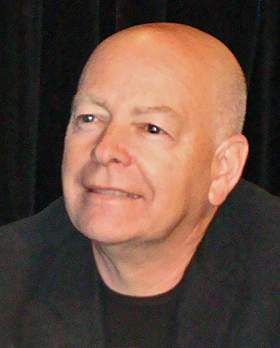
Gregg
McNair speaking at
T.R.A.F.F.I.C. Silicon Valley - April 2009 |
McNair explained how he was
introduced to the domain business. "There was a guy at
our church, Steve Bjerking, that I had struck up a
friendship with. He had been away running an IT business in Hong
Kong and when he came back to Melbourne in late 2005 Beth and
I invited him and his partner, Alphan Culha,
over for dinner. Knowing my business background,
Steve asked me if I could give him some tax advice,"
McNair recalled. "While looking over his books I saw that
there was tremendous potential in what he was doing with
domains."
|
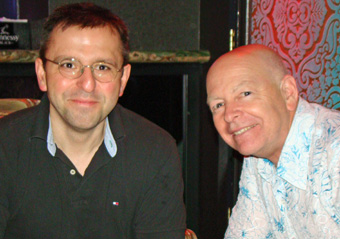
PPX
International partners Alphan Culha
(left)
and Gregg McNair at the Domain Roundtable
conference in Washington, D.C. - June 2009 |
"The three of us and a fourth
partner whom we bought out earlier this year decided to join
forces and start a new Mauritius
based business to buy, sell and trade domain names. We
started rolling up portfolios of names in 2006 with a
plan to sell out when the time was right. We actually
wound up doing that twice! After selling the first
group of portfolios we had amassed to Demand
Media we started over, repeated the process and
sold again about 18 months ago. In that deal our
company, Strata Services agreed to stay on as
managers of the portfolio for 10 years with a high
revenue share as compensation. In the first sale we
also wound up with a significant amount of Demand
Media stock," McNair said.
|
|
In addition, Bjerking and
Culha personally signed service contracts with Demand
Media. Once those were completed, the partners started
diversifying into new businesses, both in and out of the domain
space. They bought into a digital media company in New York,
an IT consulting firm in Australia and
became lead investors in a northern bluefish tuna
hatchery in Spain, plus domain businesses and
property investments in Panama and elsewhere.
Their core business was now providing domain management
services for some of the world's top portfolio holders. With
that responsibility, they grew increasingly uneasy over the
past 18 months with their dependency on Google and Yahoo
for PPC revenue. As those revenues continued to drop, the
urgency to find alternatives increased. |
The pieces to the puzzle they wanted
to solve started falling into place this year. In February at
the Domainer
Mardi Gras conference in New Orleans McNair
met PPX.com owner Sam Dennis and within two
months they had struck a deal for Strata to buy PPX, a company
that had a monetization system that allows clients to access
CPA (cost per acquisition) advertising as well as other forms
of monetization on the same system.
A month later, Strata bought JB
Media, a consumer product marketing and manufacturing
company that gave Strata a way to boost CPA payouts by
offering products that they owned manufactured, marketed and
delivered, giving them ownership of the entire vertical.
|
At the end of August, Strata and PPX
were combined into a new Hong Kong based entity called PPX
International. On October 1st, McNair was named Executive
Chairman of the company and Dennis was designated CEO.
Bjerking and Culha are also Directors and an integral part of
the management team. The
new firm has access to eight different PPC providers as well
as their own CPA provider, a combination they say has a very positive
impact on revenues generated.
"We have 12 verticals
we can pay out through CPA," McNair said.
"CPA currently comprises 5-10% of the
traffic and we expect that to grow
|

|
| to 15-20%
over the next 12 months. We are building additional verticals
and the development staff we have hired to work on that has
grown from 10 to 30 people." Meanwhile the staff for the
entire company has swelled from 17 to 150 members. |
In another major initiative, PPX
International recently acquired the domain LiveBetter.com
which they intend to build into a major consumer products
brand. McNair said they are currently introducing two new
nutraceutical products every 25 days.
|

|
Veteran domain investor Richard Lau
is a member of the PPX International board and McNair said Lau
introduced him to a charity project that he has become passionate
about - The
Water School (TWS) - an organization with a
mission to eradicate disease and needless loss of life by
providing simple, safe, strategic, and sustainable clean water
solutions to the developing world.
TWS was founded in 2007 by Bob
Dell, a water scientist, and Fraser Edwards, a
businessman with decades of experience in partnering with
indigenous leaders to implement lasting change. The Water
School currently implements inexpensive and effective solar disinfection
through its |
| integrated teaching program of health and hygiene,
called SODIS. A donation of just $50 will
provide a family of six with safe, clean drinking water for
life.
McNair, who has been involved in
charity outreach programs in the Phillipines for 20
years wanted to see the TWS operation in person before fully committing
to support it, so in April of this year he led a group of
domain industry leaders to Uganda to see how much
the SODIS solar disinfection system (developed by
Switzerland and improved on by Water School scientists)
was benefiting people in Africa. He saw that once they were
shown how to operate the system, they were self sufficient
from that point on. McNair was immediately convinced and has
been spreading the word ever since. |
He took another domain industry
group, with the number rising to 18 this time, to Kenya
in September to see the TWS program in action. McNair said
some of the young people who went on this trip told him that
seeing how people have to live there, how much the availability
of clean water improves their life and the deep gratitude the
men, women and children all expressed for that helping hand
has changed their lives forever.
|
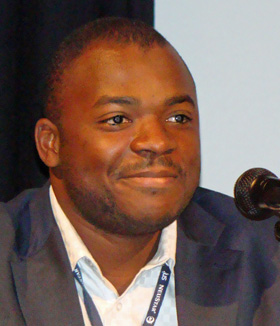
Saya
Kaigama Moustapha
speaking at T.R.A.F.F.I.C. Amsterdam
June 2009 |
Before coming home from Africa,
McNair joined three Water School leaders on a trip to nearby Cameroon
to look into taking the SODIS technology there. That trip was the result of McNair meeting
Saya Moustapha, head of Cameroon's .cm registry,
at the T.R.A.F.F.I.C.
ccTLDS conference in Amsterdam last June.
When Moustapha heard about the Water School program from
McNair he asked him if TWS could come to Cameroon and help
people in his homeland. As a result of that visit TWS is now
scoping out projects in rural Cameroon with Moustapha.
In
March 2010, right before the ICANN meeting in Nairobi,
acting on a suggestion from Rick Latona, McNair will
take a group back to Africa to climb Tanzania's Mount Kilimanjaro
in a fundraising effort for TWS. Sponsors will be sought for
the participants, with at least 30 currently expected to take
part. The cost to participate is $2,100 plus airfare.
The fee will cover all ground transportation, accommodations
and meals. You
can visit Kili2010.com
for more information on the trip.
|
|
McNair
is particularly hoping that industry companies will offer
sponsorships to send young industry people on the trip.
"If they get this opportunity it will give them
the vision for giving – and know that it is
possible to make a difference, even if the problem is
huge," McNair said. |
| "Then when they become successful they will
influence others in turn." McNair speaks from experience
on that point. He was first exposed to third world needs when
a sponsor sent him to New
Guinea to see for himself. He has been involved in
frequent outreach trips ever since.
McNair said
the Water School's administrative costs for the year
2010 are already independently underwritten so that 100%
of every dollar donated by the domain community will
go into the African field to help people rather than
cover administrative expenses. His longer term goal is
to get industry backing to fund a $200,000
monthly budget for TWS activities so they will have a funding
source they can count on. He said he already has pledges close to $150,000 monthly. |
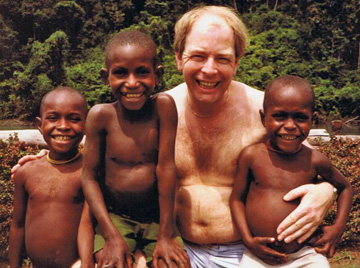
McNair
was first exposed to third world needs
on this sponsored trip to New Guinea |
The
primary reason McNair agreed to do this interview and talk
about his life and business operations publicly for the first
time was to spread the word about the Water School and acknowledge
the industry support already given to the organization. As
just one example, McNair visited me just a few days
after receiving a $4,500 donation from Sedo CEO Tim
Schumacher at the SedoPro
Partners Forum that we both attended in Key
West, Florida.
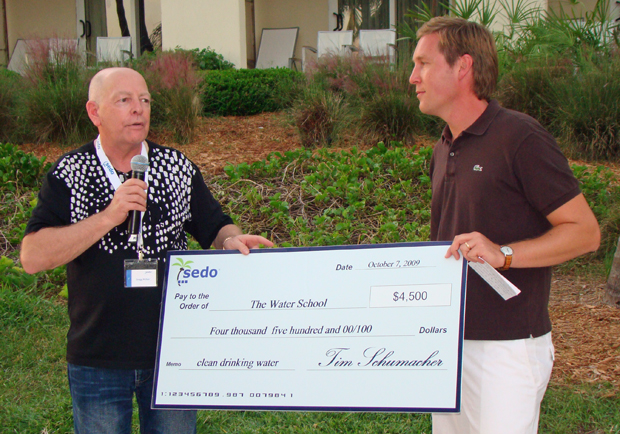
Gregg
McNair accepts a $4,500 donation to The Water
School from Sedo CEO
Tim Schumacher at the SedoPro Partner Forum in
Key West, Florida - October 2009
McNair
said he keeps working even though he no longer has to so he
can work on philanthropic projects like TWS. Gregg’s passion
for philanthropy is shared equally by Beth and his business
partners. He added that
his only regret is that the time devoted to such worthy
causes has kept him from spending as much time with his four
kids and six grandchildren as he would like.
Talk
is one thing but being willing to get your hands dirty
is another and McNair clearly hasn't shied away from that
while spreading the Water School gospel. In fact, on that
September trip to Kenya, McNair's hand got a lot more than
just dirty. While driving down the road in the bush country
they came upon a cow lying by the side of the road.
McNair spotted two hooves sticking out from the cow's rear in
an inverted position. The former farmer immediately
recognized a breech birth situation that threatened the lives
of both the mother and the calf.
They stopped their van,
McNair jumped out, pulled off his watch and stuck it in
his back pocket, then proceeded to internally turn the
calf around so it could make its entrance into the world
rather than perish. He then birthed the calf with the
assistance of one of the Africans in the group. Kenya is
currently in a desperate state of drought with emaciated
cattle everywhere through lack of feed, a situation that
contributed to the cow’s dilemma.
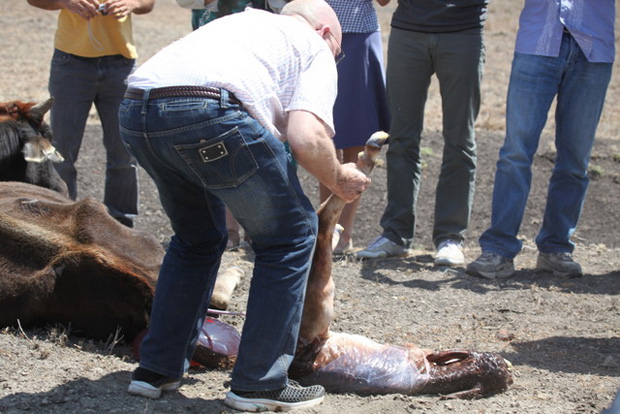
Gregg
McNair finishes delivering a calf during an unexpected
encounter in Kenya - Sept. 2009
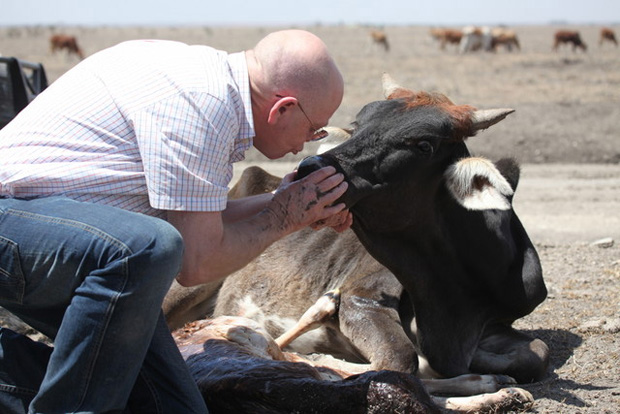
Mother
and Good Samaritan share a kiss after the birth
(photos courtesy of Richard Lau)
|
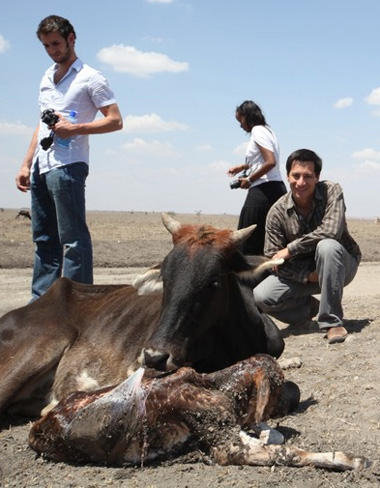
Mother
cleaning up her new calf SODIS |
McNair's
big concern was that two more vans were following his from
some distance back. If they had pulled up and caused a
commotion the cow could have gotten up and bolted with McNair
hanging on to the calves' two hooves for dear life. The
thought conjures up a funny vision, but he had seen it happen
before during his farming days. Fortunately all went
well other than the fact that his traveling companions had to
douse McNair from his shoulders to fingertips with every ounce
of hand sanitizer they could muster to clean up the good
"doctor" after his impromptu procedure.
McNair
brushed off the amazement expressed by those who witnessed the
delivery noting "It's like riding a bicycle - once you
learn you never forget," he laughed. The new calf was
quickly named Triple-G (in honor of Gregg), but
was later rechristened SODIS to recognize the
organization that has saved so many lives by sending
people to Africa who want to make a difference in
this world. |
|






